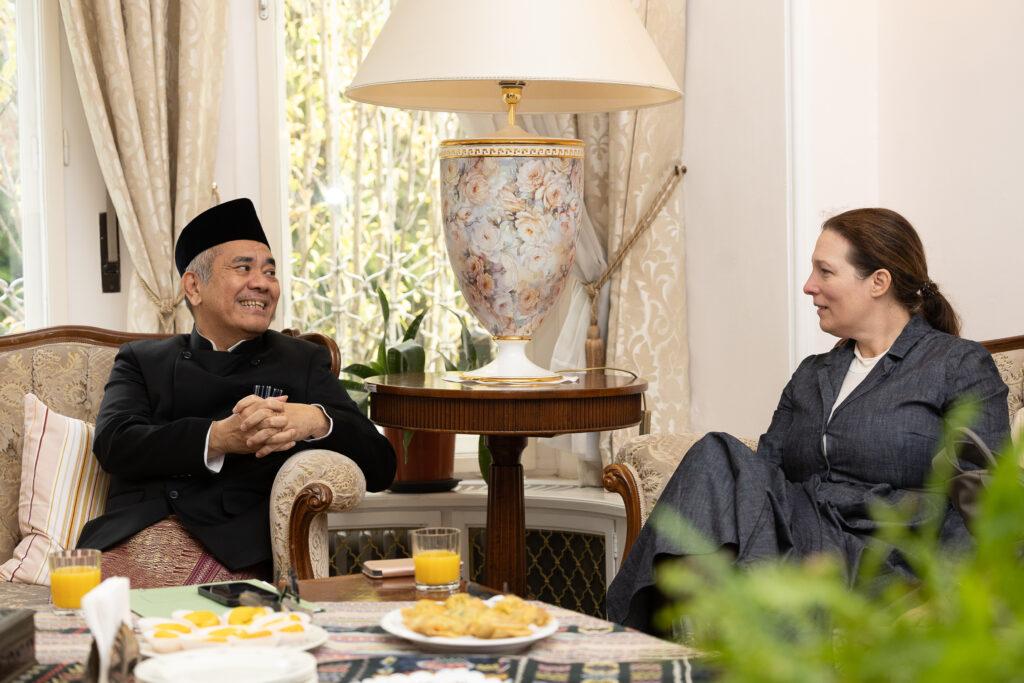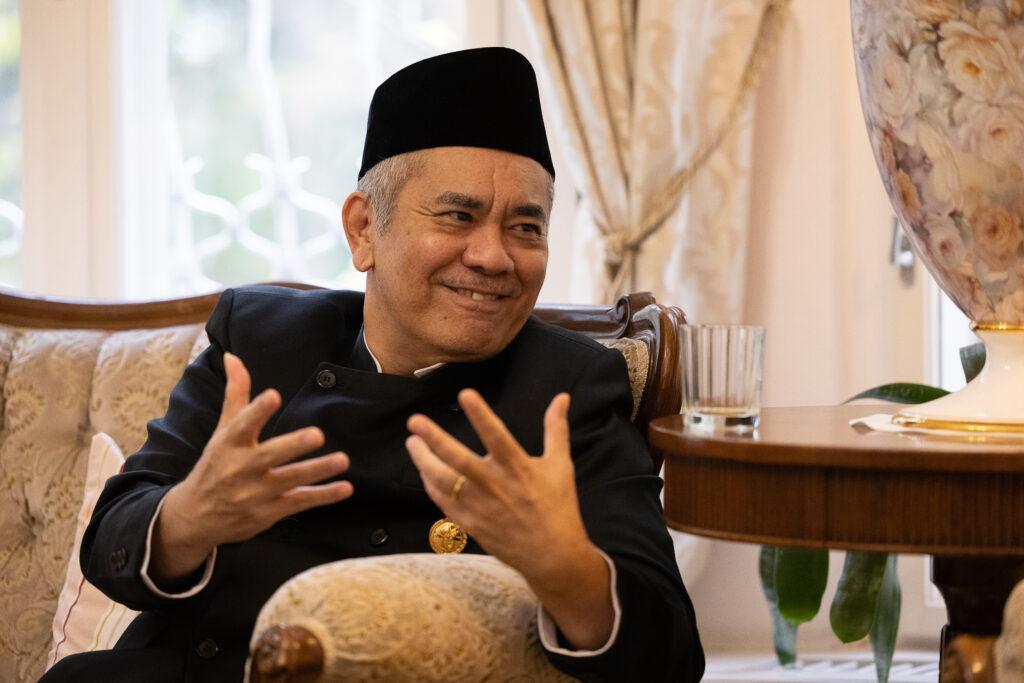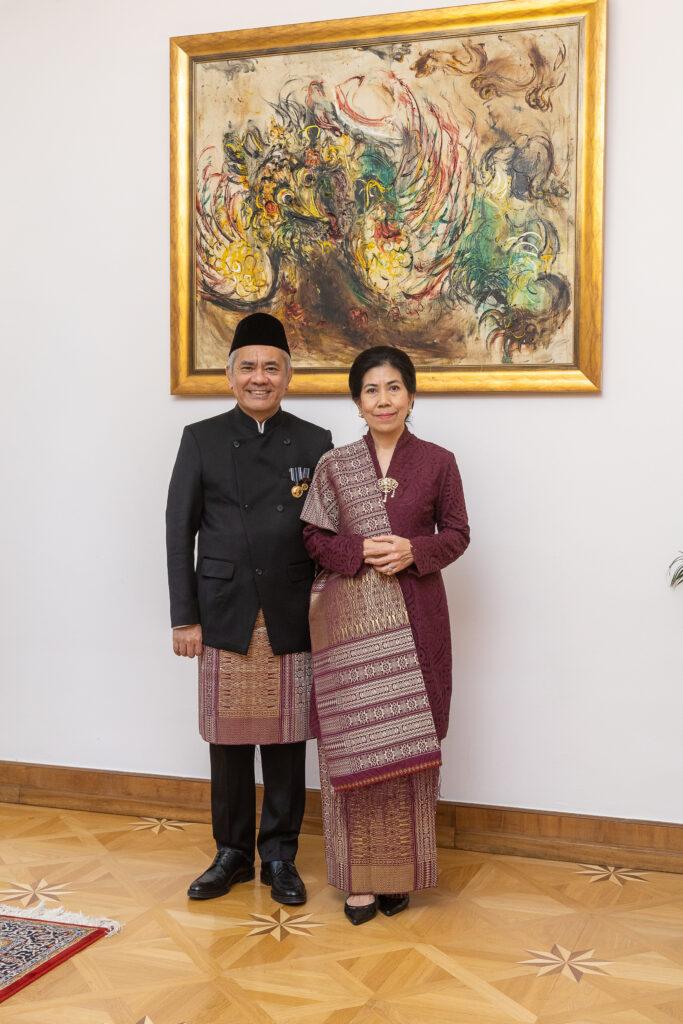SOCIETY met with H.E. Damos Dumoli Agusman, Ambassador of Indonesia to Austria to talk about the surprising similarities between his country and Austria.
Austria and Indonesia will be celebrating 70 years of diplomatic relations in 2024. What characterizes these ties?
Despite the geographical distance and cultural differences, Indonesia and Austria have nurtured a strong and cooperative relationship. Both countries continue to work on deepening their ties and exploring new areas of collaboration for mutual benefit.
Politically, both countries have expressed respect for each other’s sovereignty and territorial integrity. They’ve also collaborated on various international forums and have similar views on many global issues, including the importance of multilateralism.
Indonesia and Austria continue to explore opportunities for enhancing bilateral, trade and investment cooperation. We have two biannial forums to explore, namely the Bilateral Consultative Forum every two years since 2009 and the Interfaith and Intercultural Forum since 2004. Both forums met last year in 2022 in Vienna, we expect the discussion to continue in Indonesia next year.
Our countries have engaged in cultural exchanges to promote mutual understanding and appreciation. Some Austrian institutions offer Bahasa Indonesia courses, namely the University of Vienna School of Socio-Cultural Anthropology, while there have been Indonesian cultural performances and exhibitions in Austria and vice versa. Moreover, there have been educational exchanges and scholarship programs to facilitate academic collaboration, such as those under the umbrella of the ASEAN European Academic University Network or ASEA Uninet.
Austria has provided technical assistance and support for various development projects in Indonesia, including in sectors like vocational training of labor sector, forestry and environmental conservation. In particular the vocational training, Austria has built several training centers in Medan, North Sumatera and Banyuwangi, East Java.
There’s also a mutual interest in promoting tourism. Indonesians are attracted to Austria’s historical sites, music, and winter sports, while Austrians are drawn to Indonesia’s tropical beaches, culture, and heritage sites. Last year in 2022, around 18.000 Austrians visited Indonesia while mid this year (alone in July) has almost surpassed that number.
The two countries have explored and fostered cooperation in areas such as renewable energy, environmental conservation, and sustainable development.
I am looking forward to being a stable and reliable partner and exploring opportunities to expand cooperation in all areas. Entering the 70th anniversary of the bilateral relations, the relations between Indonesia and Austria are getting stronger every day.
Can you tell us a bit about the principles of Indonesia’s Foreign Policy and the concept of “mendayung antara dua karang” (“rowing between two reefs”)?
„Mendayung antara dua karang“ means navigating Indonesia’s foreign policy carefully. The Government is of the firm opinion that the best policy to adopt is one which does not make us the object of an international conflict. On the contrary, we must remain the subject who reserves the right to decide our own destiny and fight for our own goal, which is independence for the whole of Indonesia. It’s about avoiding entanglement in great power conflicts and protecting sovereignty and balancing relationships with major powers without aligning with any bloc.
This reflects Indonesia’s commitment to independence and balanced diplomacy. While “Mendayung antara dua karang” was relevant during the bipolar Cold War world, a more enduring “Bebas Aktif” foreign policy has become a rather more relevant framework for dynamic foreign policy that contributes to global stability.
In the framework of the vision “Golden Indonesia 2045“, the Indonesian Government has set itself a number of goals for a prosperous future of the country. What are the main pillars of this vision?
As Indonesia inches closer to its centennial anniversary of its independence in 2045, hence the “Golden Indonesia”, many analysts predicted that Indonesia is set to take advantage of its demographic dividents and achieve a status of 5th largest economy in the world by 2050. And rightly so, we have to prepare for this inevitability, be it in the governance, infrastructure, labor market, productivity, and effectivity of using our natural resources.
The achievement of the Indonesian Vision is built on 4 pillars of development, namely Human Development and Mastery of Science and Technology; Sustainable Economic Development; Equitable Development; and Strengthening National Resilience and Governance.
Each pillar contains various development sectors, from education to foreign policy, that must be developed and accelerated until 2045 to realize the Indonesian Vision 2045.

Overall, the Indonesian Vision 2045 aims to achieve a better and more evenly distributed level of welfare for the Indonesian people, with a higher quality of human resources, an elevated economy that positions Indonesia as a developed country and one of the top 5 economic powers in the world and a just and equitable development in all sectors, all within the framework of the sovereign and democratic Unitary State of the Republic of Indonesia.
Between 2000 and 2004, you already lived in Vienna and served as Counsellor of the Indonesian Embassy to Austria. What do you appreciate about Vienna/Austria?
What I have noticed about Vienna is, that is has not changed much since I first came here. What is different though is, that more people are able to speak English now, which was not the case twenty years ago, which actually forced me to improve my German back then. As a lawyer, I would also like to promote in Indonesia, that a significant contributor to the theory of judicial review, Hans Kelsen, was Austrian and I have already taken a photo with his statue at Juridicum. Being a Christian, I have also visited the chapel in Oberndorf, where “Silent night” was sung the first time.
Photos: SOCIETY/Pobaschnig




